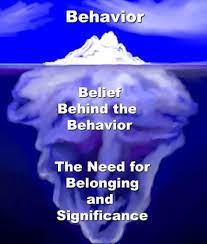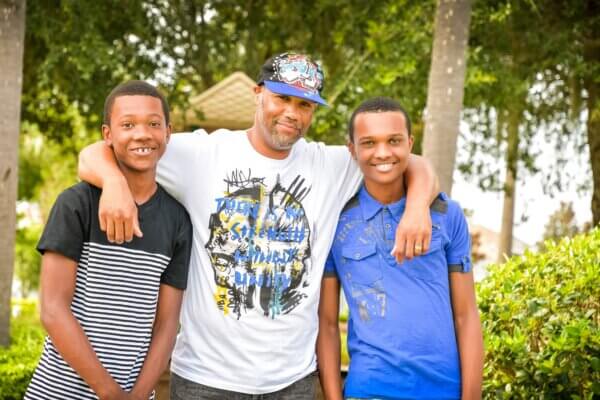Getting curious about the Belief Behind Behavior
If you’re here reading this, then you’re curious about Positive Discipline or you practice Positive Discipline, and I want to support you. Today, I’m going to break down “the belief behind the behavior” which is also known as the mistaken goals of behavior.
A few years back I did an interview with Alison Smith. It touched on the importance of finding the need beneath the behaviors we see. I also often reference the iceberg metaphor – the idea that behavior we’re seeing is just the tip of the iceberg, and if we can go under the surface and really get to what’s fueling the behavior, we can make lasting, sustainable change in our home environment.
Today we’re going to dig even deeper into these ideas through the lens of Positive Discipline. Here’s a little Positive Discipline 101: Positive Discipline is a book and a parenting program written by Jane Nelsen. Jane has authored and co-authored many books in the Positive Discipline library. Positive Discipline is a stand alone philosophy of program deeply rooted in Adlerian theory. While Positive Discipline definitely fits under the umbrella of positive parenting, understanding the mindset shift that is invited when you begin to study and practice Positive Discipline is really key. I think a lot of people think of positive parenting and think, “Yeah! I want to do positive parenting! I want to not yell, I want to not spank.” But Positive Discipline is a whole different mindset shift.

Most of us were raised with the behaviorist model of parenting. Crudely defined, that’s the idea that through the discomfort from imposed consequences and from the good feelings from rewards, kids will learn to do the right thing. There’s power in the adult’s approval and disapproval. It’s the idea that if we use the right consequences and rewards, our kids will be easygoing, polite, contributing members of society. The assumption is that kids have the tools to be cooperative and in contribution and choose to act otherwise. There’s a lot of conversation around choices in the behaviorist model.
Positive Discipline, rooted in Adlerian theory, is different. The idea here is that behavior is motivated by our perceptions of belonging and significance. A child who has a rock solid connection and sense of purpose will show up more cooperatively and easygoing than one who believes they are disconnected and don’t matter. The assumption is that kids are doing the best they can with the tools they have. Perception matters, and the most powerful tool we have to motivate them lives inside the relationship that we’re nurturing. We always want to be looking at skill development in Positive Discipline.
It’s moving from “what do I need to do to my child to get them to do the right thing?” to “what does my child need to support them in learning to do the right thing? It’s changing your lens from “my child is a problem” to “my child is having a problem.” It’s a small tweak in words but a big mindset shift. We come into parenting deciding who we want to be, then our kids come in and get opinions and turn into teenagers and want to live their own lives. Our behaviorist conditioning really gets poked!
I’m going to name some behaviors here that drive parents crazy. We all have different flavors of challenges, but we’re on a collective journey here. I am confident that the behaviors that drive me crazy will be on your list, too, even if you have other things:
Dishes piling up in your kid’s rooms?
Needing multiple requests to help out?
Drama around schoolwork?
Kids with snarky attitudes?
Disrespect?
Defiance?
Boundary pushing?
Unwillingness to try new things?
Sibling conflict?
Did you nod at any of those? Yeah! We are on a collective journey. These things happen at my house, too. Sometimes there’s an idea that people who speak and write about parenting somehow have it all figured out and it’s easy for us, and that is a load of crap! It’s just not true. One thing I will give myself credit for is a longstanding practice of personal growth and finding stillness, mindfulness, and presence. That has helped me with the things that show up, but there are plenty of moments where I’m caught off guard, my emotions take over, and I’m not a Positive Discipline parent. We are the same.
Let’s play with just one of those examples in particular to highlight what can happen, looking at the iceberg. At the top of the iceberg, let’s put “school drama.” That’s the challenge, and we want to get curious about what’s going on under the surface there. School drama can look different for everyone, and the key to understanding what’s going on deeper in the beliefs of your child is starting with you getting clear about how you are experiencing your child’s behavior. It’s an invitation to some personal growth and awareness here. We have to grow awareness of our own experience if we want to make sense of what’s happening around us. We can’t just ignore the fact that we’re having an emotional experience because there’s a lot of information in that experience. We must start with us to create lasting change.
So, start by paying attention to how it feels when the school drama comes up with your child. My guess is you will be feeling one of four ways:
Attention Seeking
Maybe your child only works on schoolwork when you’re there over their shoulder, paying attention, checking dashboards, and then they stop as soon as you walk away. That would feel annoying and irritating, right? This is like a pesky fly that won’t leave you alone. Maybe you’re eye rolling or thinking, “Gosh, why can’t you just do this?” But it stays pretty light – just an annoyance.
Your child may be feeling:
“I’m important and connected with you when you’re paying attention to me” So the behavior is designed to keep you engaged with that, and it can be really annoying.
Power Struggle
Maybe your child won’t follow the guidelines you’ve established for the school routine and your child is defiant about it. This could invite you to feel angry or challenged. There’s more intensity, your hackles are raised. You might be feeling like, “You will do this. This is how it will go down.” You might feel rigid, and you might end up in a stand-off.
Your child may be feeling:
“I matter when I’m in charge (or when I’m proving that you’re not).” This can lead to power struggles.
Revenge
Maybe your child is lashing out at you about school. “I don’t care about school! Who cares!” This might leave you feeling hurt or defeated. It can feel like a real punch to the gut. You might take it really personally.
Your child may be feeling:
This is a kid who feels disempowered and disengaged. They don’t feel belonging or significance, so they lash out at us. We’re receiving the hurt that they’re feeling.
Avoidance/Helpless/Hopeless
Maybe your child quietly avoids school. Maybe they’re passive or disengaged or unwilling to make an effort. You might feel despair, hopelessness, or inadequate. This is not a fiery thing, this is a quieter, helpless place. You might feel wrung out and like you have no more to give.
Your child may be feeling:
This is a kid who thinks “I can’t matter. I can’t belong. I’m not good enough.” That’s a heart wrenching place to be.
Do you see yourself in any of those scenarios? There’s more to it than this, but this model was first designed by Rudolf Dreikurs, a student of Alfred Adler. He found that typically, the first reason that kids misbehave is because they want attention or seek connection.
“Kids long for connection but will settle for attention.”
This can happen in the teen years as we try to give them more space, and they miss that connection. If they don’t experience the connection that they crave through their actions, they move onto seeking power. If the power struggle exists and we remain really rigid, they might start to seek revenge. “Now I feel disconnected AND powerless. I’m passing this pain around!” This is where things can feel really personal and hurtful. If you are living with a teenager who is mean to you, that is a sign that there is some hurt for that kid. Your job is to get curious and reach out to them in a way that allows them to open up and share. If revenge does not achieve their desired outcome, they’ll start to withdraw and feel inadequate to avoid humiliation.
I know you love your children with all of your heart! I know it’s the most vulnerable, tender, raw relationship that you’ll ever experience. I know the last thing you want to do is give them a complex. I know you want what’s best for them. Parenting is emotional, and sometimes our best intentions can be delivered in a way that sends a message that we don’t’ mean to. Kids are good perceivers but not great interpreters. They make meaning through a filter that’s only as developed as their life experience. We can be sending a message that’s received totally differently by them.
The good news is that the dynamics in your home can be shifted by how you show up. Here’s my one tip for today: connect. Create special time. I know we have teenagers and some of us have teenagers who don’t want anything to do with us. Don’t use that as an excuse. You have to create connection with your teenager.
Today, start with a note. Write them a note that tells them how much you love them. Add the characteristics you see developing in them (the good ones) and just send the note without any expectation! Texts are good for this. Then don’t follow up. Just let them be and notice what happens. As you notice your teens softening, then maybe you can invite them to join you for a walk or a show on Netflix.
Listen to Casey dig deep into the Belief Behind the Behavior in these four Joyful Courage episodes:
Eps 263: Solo Show- Belief Behind Behavior Deep Dive Part 1
Eps 265: Solo Show- Belief Behind Behavior Deep Dive Part 2: Misguided Power
Eps 267: Solo Show- Dissecting Beliefs Behind Behavior Part 3: Revenge
Eps 269: Solo Show Dissecting Beliefs Behind Behavior Part 4- Assumed Inadequacy





Comments